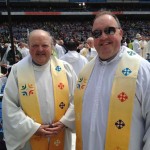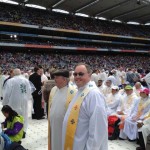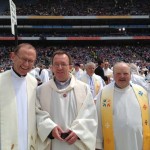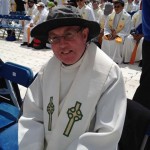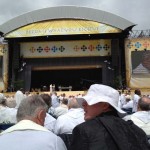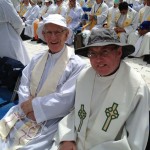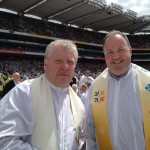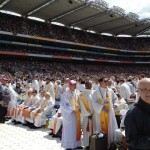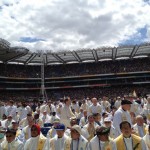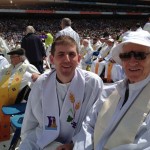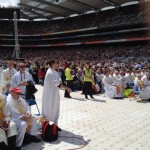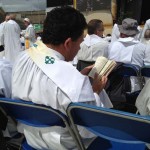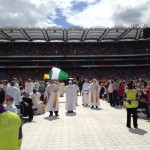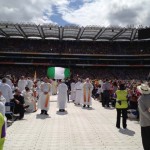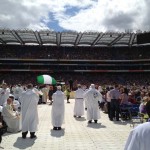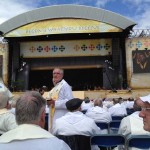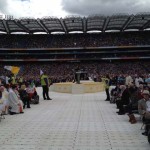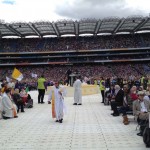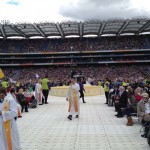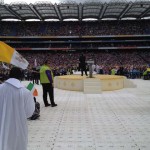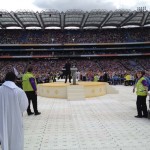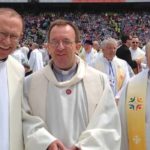Some images of the final Mass of the Eucharisitic Congress of 2012, IEC2012. Congratulations to Fr. Pat Farragher our own local coordinator who worked tirelessly to organise everything for us in Tuam.
Message from His Holiness Pope Benedict XVI to the 50th International Eucharistic Congress 2012
Dear Brothers and Sisters,
With great affection in the Lord, I greet all of you who have gathered in Dublin for the Fiftieth International Eucharistic Congress, especially Cardinal Brady, Archbishop Martin, the clergy, religious and faithful of Ireland, and all of you who have come from afar to support the Irish Church with your presence and prayers.
The theme of the Congress – Communion with Christ and with One Another – leads us to reflect upon the Church as a mystery of fellowship with the Lord and with all the members of his body. From the earliest times the notion of koinonia or communio has been at the core of the Church’s understanding of herself, her relationship to Christ her founder, and the sacraments she celebrates, above all the Eucharist. Through our Baptism, we are incorporated into Christ’s death, reborn into the great family of the brothers and sisters of Jesus Christ; through Confirmation we receive the seal of the Holy Spirit; and by our sharing in the Eucharist, we come into communion with Christ and each other visibly here on earth. We also receive the pledge of eternal life to come.
The Congress also occurs at a time when the Church throughout the world is preparing to celebrate the Year of Faith to mark the fiftieth anniversary of the start of the Second Vatican Council, an event which launched the most extensive renewal of the Roman Rite ever known. Based upon a deepening appreciation of the sources of the liturgy, the Council promoted the full and active participation of the faithful in the Eucharistic sacrifice. At our distance today from the Council Fathers’ expressed desires regarding liturgical renewal, and in the light of the universal Church’s experience in the intervening period, it is clear that a great deal has been achieved; but it is equally clear that there have been many misunderstandings and irregularities. The renewal of external forms, desired by the Council Fathers, was intended to make it easier to enter into the inner depth of the mystery. Its true purpose was to lead people to a personal encounter with the Lord, present in the Eucharist, and thus with the living God, so that through this contact with Christ’s love, the love of his brothers and sisters for one another might also grow. Yet not infrequently, the revision of liturgical forms has remained at an external level, and “active participation” has been confused with external activity. Hence much still remains to be done on the path of real liturgical renewal. In a changed world, increasingly fixated on material things, we must learn to recognize anew the mysterious presence of the Risen Lord, which alone can give breadth and depth to our life.
The Eucharist is the worship of the whole Church, but it also requires the full engagement of each individual Christian in the Church’s mission; it contains a call to be the holy people of God, but also one to individual holiness; it is to be celebrated with great joy and simplicity, but also as worthily and reverently as possible; it invites us to repent of our sins, but also to forgive our brothers and sisters; it binds us together in the Spirit, but it also commands us in the same Spirit to bring the good news of salvation to others.
Moreover, the Eucharist is the memorial of Christ’s sacrifice on the Cross, his body and blood given in the new and eternal covenant for the forgiveness of sins and the transformation of the world. Ireland has been shaped by the Mass at the deepest level for centuries, and by its power and grace generations of monks, martyrs and missionaries have heroically lived the faith at home and spread the Good News of God’s love and forgiveness well beyond your shores. You are the heirs to a Church that has been a mighty force for good in the world, and which has given a profound and enduring love of Christ and his blessed Mother to
many, many others. Your forebears in the Church in Ireland knew how to strive for holiness and constancy in their personal lives, how to preach the joy that comes from the Gospel, how to promote the importance of belonging to the universal Church in communion with the See of Peter, and how to pass on a love of the faith and Christian virtue to other generations. Our Catholic faith, imbued with a radical sense of God’s presence, caught up in the beauty of his creation all around us, and purified through personal penance and awareness of God’s forgiveness, is a legacy that is surely perfected and nourished when regularly placed on the Lord’s altar at the sacrifice of the Mass. Thankfulness and joy at such a great history of faith and love have recently been shaken in an appalling way by the revelation of sins committed by priests and consecrated persons against people entrusted to their care. Instead of showing them the path towards Christ, towards God, instead of bearing witness to his goodness, they abused people and undermined the credibility of the Church’s message. How are we to explain the fact that people who regularly received the Lord’s body and confessed their sins in the sacrament of Penance have offended in this way? It remains a mystery. Yet evidently, their Christianity was no longer nourished by joyful encounter with Jesus Christ: it had become merely a matter of habit. The work of the Council was really meant to overcome this form of Christianity and to rediscover the faith as a deep personal friendship with the goodness of Jesus Christ. The Eucharistic Congress has a similar aim. Here we wish to encounter the Risen Lord. We ask him to touch us deeply. May he who breathed on the Apostles at Easter, communicating his Spirit to them, likewise bestow upon us his breath, the power of the Holy Spirit, and so help us to become true witnesses to his love, witnesses to the truth. His truth is love. Christ’s love is truth.
My dear brothers and sisters, I pray that the Congress will be for each of you a spiritually fruitful experience of communion with Christ and his Church. At the same time, I would like to invite you to join me in praying for God’s blessing upon the next International Eucharistic Congress, which will take place in 2016 in the city of Cebu! To the people of the Philippines I send warm greetings and an assurance of my closeness in prayer during the period of preparation for this great ecclesial gathering. I am confident that it will bring lasting spiritual renewal not only to them but to all the participants from across the globe. In the meantime, I commend everyone taking part in the present Congress to the loving protection of Mary, Mother
of God, and to Saint Patrick, the great patron of Ireland; and, as a token of joy and peace in the Lord, I willingly impart my Apostolic Blessing.
Homily for the “Statio Orbis” of the International Eucharistic Congress
Marc Cardinal Ouellet
Prefect of the Congregation for Bishops
Papal legate to the international eucharistic congress
June 17, 2012
Dublin, Ireland
Dear brothers and sisters,
The fiftieth occurrence of the International Eucharistic Congress is now coming to a close. We are deeply grateful to God for the light of His Word and for the gift of the Holy Eucharist, which strengthen our communion with Christ and with one another.
At the end of this celebration we will listen to the message of Pope Benedict XVI. His speaking to us reminds us that this International Eucharistic Congress bears witness to the Catholic Church as the universal communion of many particular Churches. The Bishops, priests, religious and lay faithful here represent the Catholic Church which is found throughout the world in thousands of communities, but which is one in faith and love of Jesus Christ. I greet the ecumenical representatives and I thank you all for being part of this grace-filled event.
I greet the President of Ireland, and all the civil authorities, fondly aware of the noble tradition of this courageous nation. I thank wholeheartedly Archbishop Martin, Cardinal Brady and all the collaborators of this event for the gift of their warm hospitality and for the example of their strong dedication to Christian renewal in this country.
In order to prepare ourselves to listen to the Holy Father’s message, let us briefly reflect on today’s readings, which bring us a message of great hope and confidence.
Through the prophet Ezekiel the Lord says, “From the top of the cedar, from the highest branch I will take a shoot and plant it myself on a very high mountain. I will plant it on the high mountain of Israel. It will sprout branches and bear fruit, and become a noble cedar” (Ez. 17:22-23).
In the Gospel, Jesus uses a similar image to speak about the Kingdom of God: “[The kingdom] is like a mustard seed which at the time of its sowing in the soil is the smallest of all the seeds on earth; yet once it is sown it grows into the biggest shrub of them all and puts out big branches so that the birds of the air can shelter in its shade” (Mk. 4:31-32).
We understand the prophecy of Ezekiel in the light of Christ. Jesus Christ is the shoot taken from the highest branch, he is God from God, and planted by God himself on a very high mountain, which is Calvary.
God the Father has planted on Calvary the seed of the Cross out of love for his creation and for all sinners. The seed of the Cross is the Sacred Heart of His only begotten Son, pierced to death by our sins, but raised up from death by the power of divine mercy. Therefore Christ Jesus is the Lamb of God who takes away the sins of the world. He is the Holy Redeemer in whom we trust and find salvation. The seed of Christ’s love, buried in the ground of Calvary, produced an unimaginable fruit: a tree, the Tree of Life, a noble cedar which is the Holy Church of God, the dawn of the Kingdom. We believe in the one, holy, Catholic and apostolic Church, because we believe in Christ who wills the Church to be His body, born from the self-gift of His Eucharistic Body.
Dear brothers and sisters, let us rejoice and be full of confidence. “We are full of confidence” (2 Cor. 5:6), as St. Paul says to the Corinthians. We are so because the risen Lord is our home and our safety. We do experience limitations and failures in the Church, but the Lord sustains us, healing our wounds and strengthening our love. Let us rejoice in Him and be glad!
We can rely on the Lord for a new beginning. St. Paul gives us the key for any personal or ecclesial renewal: “We are intent on pleasing Him” (2 Cor. 5:6). This key to renewal in our lives is a decision to recommit ourselves to love the Lord and to live and to die for Him, knowing that His grace will never fail. May the upcoming Year of Faith strengthen in us this decision!
Jesus is the seed sowed by God Himself in the depths of the earth, a seed that fell to the earth, died and was raised to eternal life. From this smallest seed of salvation comes the Tree of Life, the Church, in which all of humanity is called to find a home and safety in the company of the risen Lord.
For this very reason, the Church is called, and we are called, to bear witness to the Lord by pleasing Him, that is, preaching the Gospel, living in fraternity and praising God for the gift of salvation.
After this week of Eucharistic reflection, celebration and adoration, we are certainly more aware of God’s call to communion with Him and with one another.
Let us bear witness to this grace by calling others to faith in this communion. The Irish bell, which resounds from Lough Derg, from Knock and Dublin, must resound in the whole world. Let’s ring the bell further through our personal testimony of renewed faith in the Holy Eucharist.
Faith is the most precious gift we have received with Baptism. Let’s not keep it private and fearful! Let it grow as a splendid tree through sharing everywhere!
Even if we are sometimes tested in our faith, do not be afraid, and remember who we are: the body of Christ intent on loving God over and above all things, intent on living in the Spirit of the new and eternal covenant.
We are not alone; the Spirit of Pentecost dwells in us. The communion of saints, with Mary at its heart, comes to our assistance as soon as we have rung the bell of prayer in total confidence. Keep hope and be glad, for the kingdom of God is near!
Dear brothers and sisters, at the end of this Mass we will listen to the Holy Father’s message for the conclusion of this Congress. Let us listen to him with great respect and gratitude since he is our spiritual father, a father who is holy and worthy of our trust and sincere obedience.
May our communion with the Body of Christ be a new bond of love; a small seed perhaps, but, by God’s grace and divine mercy, a fruitful one.
Together we pray the words of Saint Ephrem, deacon and doctor of the Church: “Lord … we have had your treasure hidden within us ever since we received baptismal grace; it grows ever richer at your sacramental table. Teach us to find our joy in your favour! Lord, we have within us your memorial, received at your spiritual table; let us possess it in its full reality when all things shall be made new” (Sermo 3, De fine et admonitione 2. 4-5). Amen!

